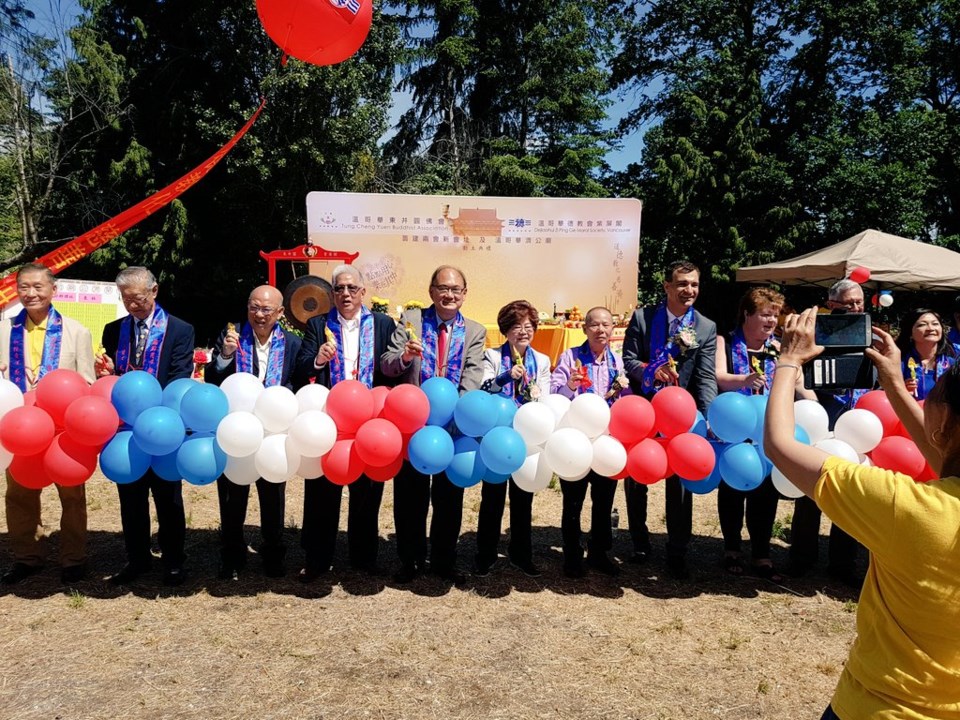A Chinese Buddhist association has lost a four-year battle with a contractor over the building of a temple on Richmond’s “Highway to Heaven.”
The Hong Kong-based Tung Cheng Yuen Buddhist Association – which has an office in Richmond’s city centre – has been planning a large temple near No. 5 and Blundell roads since 2014.
The non-profit Buddhist association hired a construction project manager, Eric Fan, of JM Bay Properties, in May, 2015 to plan and cost the building of the temple.
However, between then and December, 2017, the project’s estimated construction costs ranged from an initial $5 million to more than $9 million, prompting the deal to die a slow death.
It was around then that a William Wong, of Tung Cheng, told Fan that his organization was terminating the contract with JM Bay, which it had a right to do.
The decision sparked invoices being sent to Tung Chen that spiralled over the course of a year from $185,661.97 to $358,845.25.
A civil law suit then followed, launched by Fan and JM Bay, which finally led to a trial at the BC Supreme Court last year.
Fan and JM Bay demanded, amongst other things, payment of:
its fee, as per its construction contract;
loss of anticipated profit;
services rendered for assisting Tung Cheng with the City of Richmond rezoning application;
expenses incurred to send Fan to Guangdong province in China to view specific Buddhist temples.
Throughout the trial, Wong, on behalf of Tung Chen, denied that he, or anyone from the association, had signed off on construction costs and had expressed from the outset his and Tung Chen’s concern about the spiralling budget estimates.
Wong also told the judge at trial that he had never asked Fan to visit China to check out Buddhist temples and that he had offered to set Fan up with a guide in China as a gesture of goodwill.
It’s understood from court documents – and from a Richmond News call this week to Tung Chen - that the temple project on No. 5 Road only ever got as far as the site clearing and pre-loading stage and is awaiting a new building permit from the city.
The last plan that went to the city, according to court documents, was for a two-storey building constructed of concrete.
In his decision published last month, the judge, Justice Paul Walker, said that the “fact that JM Bay’s construction cost estimates (including the increased estimate…), and consequently, its potential fee, were preliminary is clearly set out in its proposal to Tung Cheng and was also made clear in the ongoing communications between Mr. Fan and Mr. Wong.”
In his summary, Justice Walker stated that “JM Bay is entitled to be paid a fee of 7.5% of actual construction costs incurred as of the date of termination of the Agreement.”
He added that those “construction costs” will be determined at “an inquiry conducted by the Registrar” – in reference to the court’s power to appoint a registrar or “special referee” to assess or account for a figure involved in a dispute.
Walker also stated that JM Bay’s claim for anticipated loss of profit was to be determined in a similar fashion, as well as the company’s claim for “recovery of rezoning-related services.”
Justice Walker dismissed the remainder of JM Bay’s claims, including that of the expenses incurred for the trip to China, understood to be a few thousand dollars.
According to court documents, a hearing before the registrar has yet to be scheduled.



